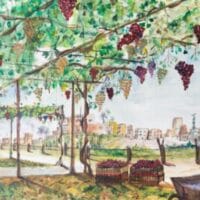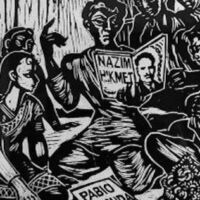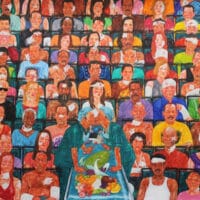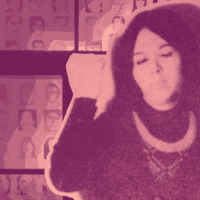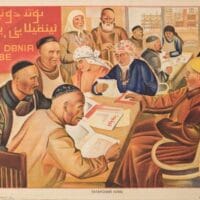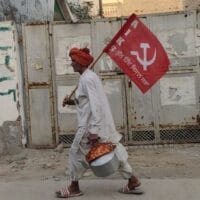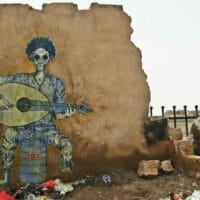-
We are in a period of great tectonic shifts: The Eleventh Newsletter (2022)
The war in Ukraine has focused attention on the shifts taking place in the world order. Russia’s military intervention has been met with sanctions from the West as well as with the transport of arms and mercenaries to Ukraine.
-
In these days of great tension, peace is a priority: The Ninth Newsletter (2022)
It is impossible not to be moved by the outrageousness of warfare, the ugliness of aerial bombardment, the gruesome fears of civilians who are trapped between choices that are not their own.
-
Those who violated the Geneva Conventions at Guantánamo are free, while the man who helped expose their crimes languishes in prison: The Eighth Newsletter (2022)
Twenty years ago, on 11 January 2002, the United States government brought its first ‘detainees’ abducted during the so-called War on Terror to its military prison in Guantánamo Bay.
-
What red book will you read this year on Red Books Day (21 February)?: The Seventh Newsletter (2022)
Out of his world of struggle and his world of books emerged Pansare’s commitment to culture and to intellectual liberation. Along with his comrades, he set up the Shramik Pratishthan (Workers’ Trust), which not only published books but also held seminars and lectures. One of the most popular programmes organised by the Trust was the annual literary festival in honour of the Marathi writer Annabhau Sathe.
-
The Left has culture, but the World still belongs to the banks: The Sixth Newsletter (2022)
Dear friends, Greetings from the desk of the Tricontinental: Institute for Social Research. ‘[T]here is great intellectual poverty on the part of the right wing’, Héctor Béjar says in our latest dossier, A Map of Latin America’s Present: An Interview with Héctor Béjar (February 2022). ‘There is a lack of right-wing intellectuals everywhere’. Béjar speaks […]
-
Make noise about the silent crisis of global illiteracy: The Fifth Newsletter (2022)
In October 2021, the United Nations Economic Commission for Latin America and the Caribbean (ECLAC) held a seminar on the pandemic and education systems.
-
Make the whole world know that the South also exists: The Fourth Newsletter (2022)
The political and cultural divisions that widened during the Trump years continue to inflict a heavy toll on U.S. society, including over the government’s ability to control the COVID-19 pandemic.
-
We are human, but in the dark we wish for light: The Third Newsletter (2022)
For over a decade, Alaa Abd el-Fattah has been in and out of Egypt’s prisons, never free of the harassment of the military state apparatus.
-
A Programme for a future society that we will build in the present: The Second Newsletter (2022)
In October 2021, the United Nations Development Programme (UNDP) released a report that received barely any attention: ‘the Global Multidimensional Poverty Index 2021’, notably subtitled Unmasking disparities by ethnicity, caste, and gender.
-
The highest attainable standard of health is a fundamental right of every human being: The First Newsletter (2022)
As we enter the new year almost two years after the World Health Organisation (WHO) declared a pandemic on 11 March 2020, the official death toll from COVID-19 sits just below 5.5 million people.
-
We dance into the New Year banging our hammers and swinging our sickles: The Fifty-Second Newsletter (2021)
Bittersweet is the passage of this year. There have been some immense victories and some catastrophic defeats, the most terrible being the failure of the Global North countries to adopt a democratic attitude towards confronting the COVID-19 pandemic and creating equitable access to key resources, from life-saving medical equipment to vaccines.
-
I want to get our rights from the Americans who harmed us: The fifty-first newsletter (2021)
The persecution of Julian Assange is a fundamental assault on journalism, press freedom, and freedom of expression.
-
They won’t ever find us because our love is bound to the rocks: The Fiftieth Newsletter (2021)
At the U.S. State Department’s Summit for Democracy (9–10 December), U.S. President Joe Biden announced a range of initiatives to ‘bolster democracy and defend human rights globally’.
-
The fierce determination of ordinary people to build an extraordinary world: The Forty-Ninth Newsletter (2021)
United States President Joe Biden has suborned 111 countries to attend his Summit for Democracy on December 9–10, ending on Human Rights Day.
-
We have to stand on our ground, the best ground from which to reach the stars: The Forty-Eighth Newsletter (2021)
During the pandemic, socialist projects–such as those of LDF government in Kerala, the Cuban educational programmes, and the MST literacy campaign–are flourishing, while other governments cut their educational funding. ‘It’s always time to learn’, says the MST literacy programme, but this adage is not in use everywhere.
-
This victory gives confidence for future struggles: The Forty-Seventh Newsletter (2021)
On 19 November 2021, a week before the first anniversary of the farmers’ revolt, India’s Prime Minister Narendra Modi surrendered.
-
In the name of saving the climate, they will Uberise the farmlands: The Forty-Sixth Newsletter (2021)
The organisers of COP26 designated themes for many of the days during the conference, such as energy, finance, and transport. There was no day set aside for a discussion of agriculture; instead, it was bundled into ‘Nature Day’ on 6 November, during which the main topic was deforestation.
-
Will the people with guns allow our Planet to breathe: The Forty-Fourth Newsletter (2021)
It is perhaps fitting that United States President Joe Biden arrived in Glasgow for the 26th Conference of Parties (COP26) on the climate catastrophe with eighty-five cars in tow months after declaring ‘I’m a car guy’ (for details on the climate catastrophe, see our Red Alert no. 11, ‘Only One Earth’).
-
Being a child in Yemen is the stuff of nightmares: The Forty-Third Newsletter (2021)
Since February 2021, the military forces of Ansar Allah have made a push to capture the central town of Marib, which is not only at the epicentre of Yemen’s modest oil refining project but is also one of the few parts of the country still controlled by President Hadi.
-
If all refugees lived in one place, it would be the 17th most populous country in the world: The Forty-Second Newsletter (2021)
On 5 October, the United Nations Human Rights Council passed a historic, non-legally binding resolution that ‘recognises the right to a safe, clean, healthy, and sustainable environment as a human right that is important for the enjoyment of human rights’.



